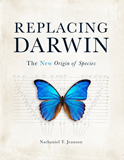
4 Tremors That Have Made Darwin Irrelevant
Editor’s Note: First published by WorldNetDaily.com on November 3, 2017.
In late November of 1859, an earthquake in England struck with such force that the aftershocks were felt around the world. This monumental event wasn’t due to a collision of plates in the earth’s crust. In fact, it wasn’t even a physical phenomenon. Charles Darwin’s publication of On the Origin of Species shook the collective scientific and religious understanding of the world so strongly that the ramifications have been felt to this day. Regardless of our individual positions on the origins debate, all of us have felt the effects of this event.
Since 1859, however, apart from Darwin, several quiet tremors have occurred. Individually, the effects of these tremors have been almost unnoticeable. Together, they have hinted at a future upheaval, of the same scale and magnitude as Darwin’s.
The first tremor was the magnificent increase in our understanding of the diversity of life. Since 1859, we’ve discovered hundreds of thousands of new species. In Darwin’s day, the scientific community knew of less than 15 percent of the species we have documented today. Yet Darwin wrote the “bible” on the origin of species.
In a polarized debate, who insists on a controversial position after examining only 15 percent of the evidence?
Imagine if this scenario played itself out in any other discipline. Let’s say I was investigating who killed President John F. Kennedy. If, after my investigation, I claim that Lee Harvey Oswald did not kill JFK, you might be intrigued. You might also ask me for my evidence. If I said that I looked at only 15 percent of the evidence, your initial curiosity might quickly be quelled. In a polarized debate, who insists on a controversial position after examining only 15 percent of the evidence?
The second tremor began its rumblings just a few years after Darwin’s first edition of his work. In 1865, Gregor Mendel first published his findings from his experiments with pea plants. Mendel initiated the field of genetics. Why is this significant? Species are defined by their traits. Yet traits are inherited consistently from generation to generation. In other words, species are defined by inheritance. What defines inheritance? In 1859, Darwin didn’t know: “Our ignorance of the laws of variation is profound.” No one in the scientific community knew until nearly 100 years after the publication of “On the Origin of Species,” when in 1953 the structure of DNA was solved. Since DNA defines species, the origin of species is, fundamentally, a question of the origin of DNA differences among species. No one has been able to answer this question . . . until now.
In other words, Darwin took an unprecedented scientific risk when he wrote his book. It’s like arguing over human anatomy and physiology—before anyone on earth has dissected a cadaver. Darwin tried to answer a genetic question before the field of genetics was ever born.
If Darwin had no genetic data, how could he have dominated the scientific community for 150 years? The answer is a consequence of the nature of science. The scientific method is a powerful method for discovering things about the natural world, but it can never prove anything about the world. Instead, the scientific method is a process of elimination. Darwin didn’t prove evolution; he attempted to disprove the competing ideas of his day.
Darwin didn’t prove evolution; he attempted to disprove the competing ideas of his day.
By analogy, it’s like arguing over which individual was the first US president. For example, I might hypothesize that Thomas Jefferson was the first president. Scientifically, I could support my claim by disproving the hypothesis that Paul Revere was the first president. At this stage, the weakness of the scientific method should begin to emerge. It’s not hard to see that Revere never was president. But there exist many, many more hypotheses on the identity of the first US president. The most important hypothesis is the one that we all know—George Washington. Simply disproving Paul Revere doesn’t automatically mean that my Jefferson hypothesis is correct.
The same principle applied in 1859. Darwin eliminated the primitive creationist ideas of his day. But creationist thinking has dramatically matured since the 19th century. This is the third tremor to have rumbled since 1859.
The fourth tremor is the emergence of comprehensive, full-fledged explanations for the origin of species that are working. They are making accurate, testable predictions about the real world. It’s like proposing a new idea in physics—and then watching the application of this idea in a successful trip to and from Mars. Modern creationist ideas are advancing our knowledge of modern genetics—and going far beyond what Darwin ever proposed.
Could another massive earthquake in science be on the way?
Recommended Resources

Answers in Genesis is an apologetics ministry, dedicated to helping Christians defend their faith and proclaim the good news of Jesus Christ.
- Customer Service 800.778.3390
- Available Monday–Friday | 9 AM–5 PM ET
- © 2026 Answers in Genesis





